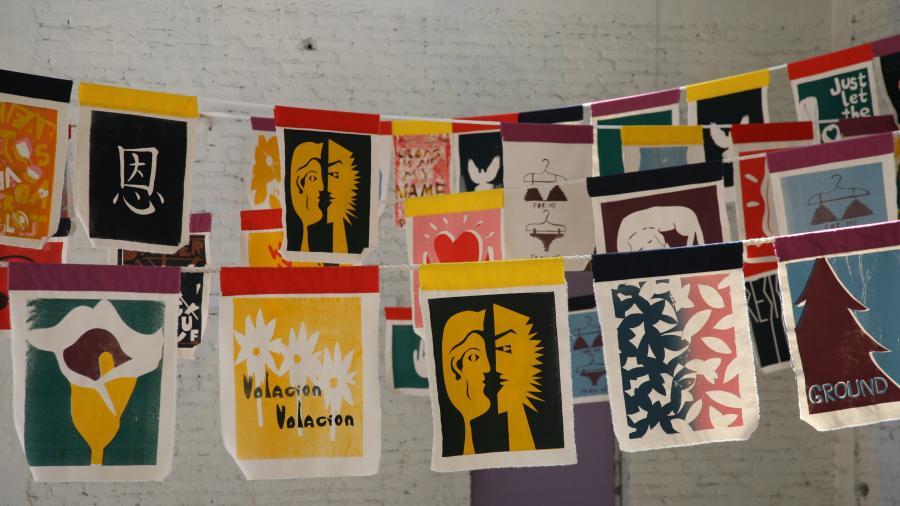Westmont Magazine Seeking Healing for Traumatized People Through Art

Art professor Meagan Stirling had already graduated from Columbine High School in Littleton, Colorado, when 12 students and one teacher were killed and 24 were injured in the 1999 school shooting. “I’d been the high school yearbook photo editor, and the national news media knocked on my dorm room door asking for photos I had taken of the school and the shooters,” she says. “I was thrust into this situation and had to deal with the impact of trauma in the community. My next-door neighbor lost his life.”
This experience inspired her to help people process trauma through screen printing, an accessible art form with bold outcomes and a history of highlighting injustices. She belongs to the Santa Barbara Printmakers, an organization Tony Askew, professor emeritus of art at Westmont, helped establish. Stirling and three other members (Claudia Borfiga, Sara Woodburn and Bay Hallowell) created Print Power and held a series of free screen printing workshops during Sexual Assault Awareness Month in April 2018 for people who had suffered sexual assault and interpersonal violence. Community Arts Workshop (CAW) hosted the events, and the artists collaborated with the Santa Barbara Rape Crisis Center. Participants learned basic screen printing techniques and how to translate their memories, ideas and feelings into personally meaningful visual images at their own pace.
“The workshops were well received, and people asked for more,” Stirling says. “The participants walked away with a work of art. The process of screen printing is both physical and immediate, allowing participants to discover their own creative wellsprings, recognize their personal strength, and grow in confidence by creating a 15-by-17-inch flag.” CAW exhibited the flags threaded on a rope and installed in its vast space.
To continue the workshops, Print Power applied for and received a grant from the city of Santa Barbara and joined with Domestic Violence Solutions to give eight additional workshops, but the pandemic shut them down after only four. The artists used the remaining funding for remote art workshops. They have another grant pending and hope to hold additional workshops when appropriate.
“It’s an incredible model for serving the community and meeting a need,” Stirling says. “People only share their experiences if and when they want to. There’s safety in a group of six to eight survivors and friends of survivors, which serves as art therapy in so many ways.”
Stirling hopes to work with sociology professor Sarah Jirek to study the efficacy of a two-hour workshop on processing trauma. They had crafted a survey for participants in the second round of workshops, but the shutdown prevented them from completing their research.
After majoring in art at Whitworth University, Stirling earned a Master of Fine Arts at the University of Wisconsin at Madison. She joined the Westmont faculty in 2014, where she met her husband, kinesiology professor Tim Van Haitsma, at the orientation for new faculty. They both just received tenure and have two daughters, 4 and 2. Managing classes and caring for their children has challenged them during the pandemic. Stirling’s mother helped out, daycare partially reopened, and they tag-teamed so they could each spend time on campus. Living in Las Barrancas, the faculty housing community next to campus, made it easier to go back and forth.
Stirling’s work focuses on how Americans perceive safety and its relation to material environments and physical objects. Her artwork has been featured in solo and group exhibitions throughout the United States. She is part of the “Matter + Spirit” international traveling exhibition and completed an artist-in-residence exchange to China, spending two weeks there and making art in response. She will participate in another residency at the Stay Home Gallery in Paris, Tennessee, this fall, allowing her to bring her family and work there for a month.
More recently, her art has involved her maternal experience. One new series focuses on clothes her children have outgrown. She pieces together hand-drawn, screen-printed stencils until the clothing appears. This lengthy process, which requires commitment and discipline, reflects the repetitive processes involved in caregiving. Once she completes a print, her daughters intuitively add their own marks, forming the final layers. The resulting chaotic and joyful marks amid the controlled and meticulous layers express her experience of raising two girls. She’ll exhibit some of these pieces during a faculty show at the Westmont Ridley-Tree Museum of Art in fall 2021.
Find more images of her work at meaganstirling.com and on Instagram @meaganstirling.







